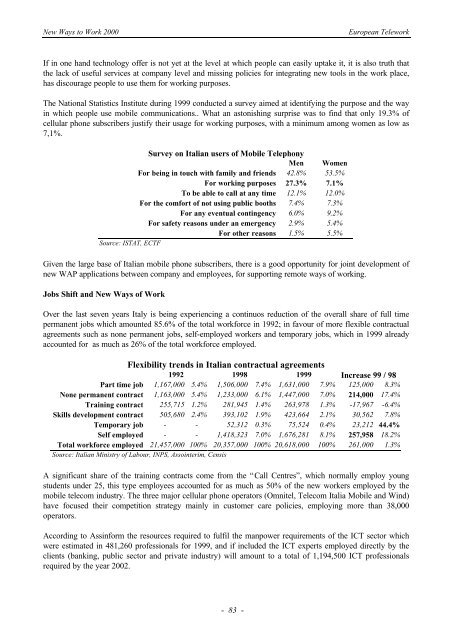eWORK 2000 - European Telework Week
eWORK 2000 - European Telework Week
eWORK 2000 - European Telework Week
- No tags were found...
Create successful ePaper yourself
Turn your PDF publications into a flip-book with our unique Google optimized e-Paper software.
New Ways to Work <strong>2000</strong><strong>European</strong> <strong>Telework</strong>If in one hand technology offer is not yet at the level at which people can easily uptake it, it is also truth thatthe lack of useful services at company level and missing policies for integrating new tools in the work place,has discourage people to use them for working purposes.The National Statistics Institute during 1999 conducted a survey aimed at identifying the purpose and the wayin which people use mobile communications.. What an astonishing surprise was to find that only 19.3% ofcellular phone subscribers justify their usage for working purposes, with a minimum among women as low as7,1%.Survey on Italian users of Mobile TelephonyMen WomenFor being in touch with family and friends 42.8% 53.5%For working purposes 27.3% 7.1%To be able to call at any time 12.1% 12.0%For the comfort of not using public booths 7.4% 7.3%For any eventual contingency 6.0% 9.2%For safety reasons under an emergency 2.9% 5.4%For other reasons 1.5% 5.5%Source: ISTAT, ECTFGiven the large base of Italian mobile phone subscribers, there is a good opportunity for joint development ofnew WAP applications between company and employees, for supporting remote ways of working.Jobs Shift and New Ways of WorkOver the last seven years Italy is being experiencing a continuos reduction of the overall share of full timepermanent jobs which amounted 85.6% of the total workforce in 1992; in favour of more flexible contractualagreements such as none permanent jobs, self-employed workers and temporary jobs, which in 1999 alreadyaccounted for as much as 26% of the total workforce employed.Flexibility trends in Italian contractual agreements1992 1998 1999 Increase 99 / 98Part time job 1,167,000 5.4% 1,506,000 7.4% 1,631,000 7.9% 125,000 8.3%None permanent contract 1,163,000 5.4% 1,233,000 6.1% 1,447,000 7.0% 214,000 17.4%Training contract 255,715 1.2% 281,945 1.4% 263,978 1.3% -17,967 -6.4%Skills development contract 505,680 2.4% 393,102 1.9% 423,664 2.1% 30,562 7.8%Temporary job - - 52,312 0.3% 75,524 0.4% 23,212 44.4%Self employed - - 1,418,323 7.0% 1,676,281 8.1% 257,958 18.2%Total workforce employed 21,457,000 100% 20,357,000 100% 20,618,000 100% 261,000 1.3%Source: Italian Ministry of Labour, INPS, Assointerim, CensisA significant share of the training contracts come from the “Call Centres”, which normally employ youngstudents under 25, this type employees accounted for as much as 50% of the new workers employed by themobile telecom industry. The three major cellular phone operators (Omnitel, Telecom Italia Mobile and Wind)have focused their competition strategy mainly in customer care policies, employing more than 38,000operators.According to Assinform the resources required to fulfil the manpower requirements of the ICT sector whichwere estimated in 481,260 professionals for 1999, and if included the ICT experts employed directly by theclients (banking, public sector and private industry) will amount to a total of 1,194,500 ICT professionalsrequired by the year 2002.- 83 -








